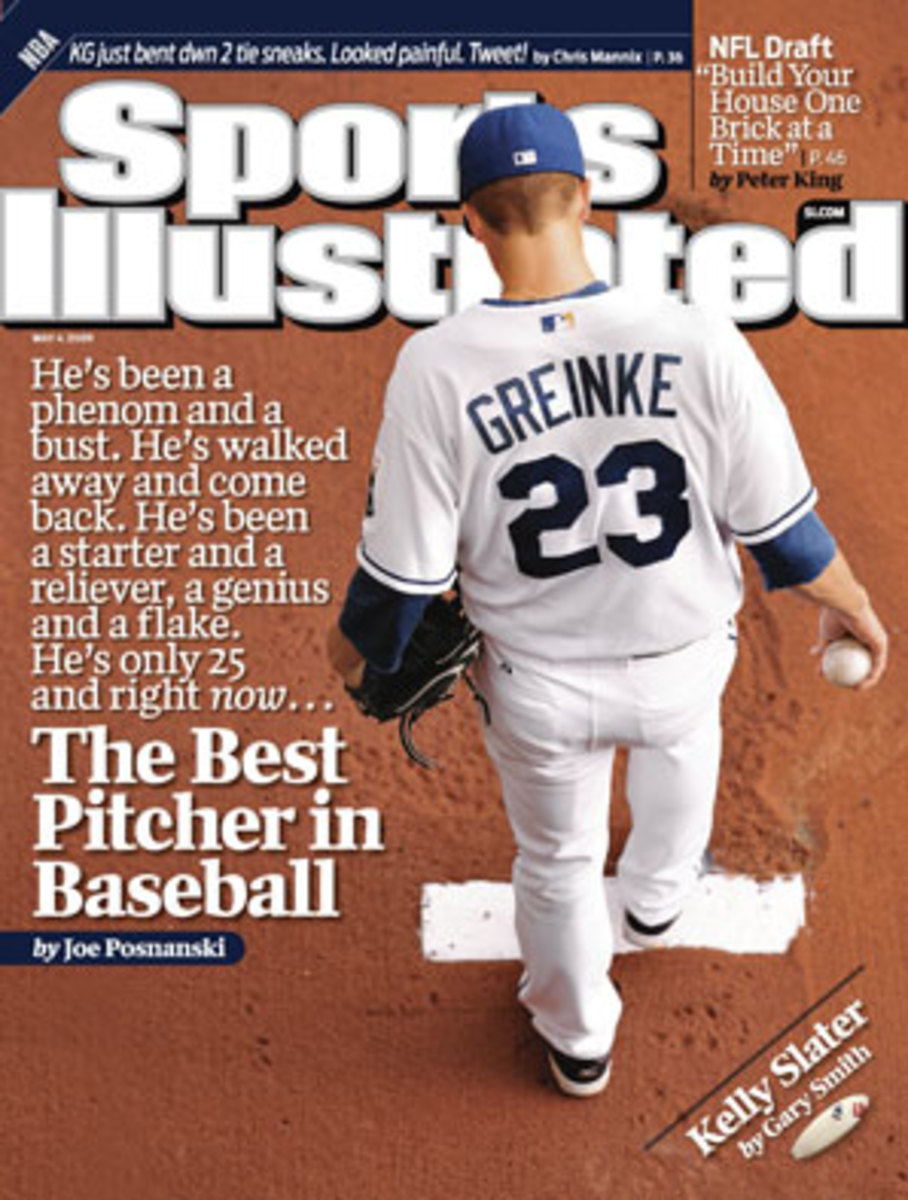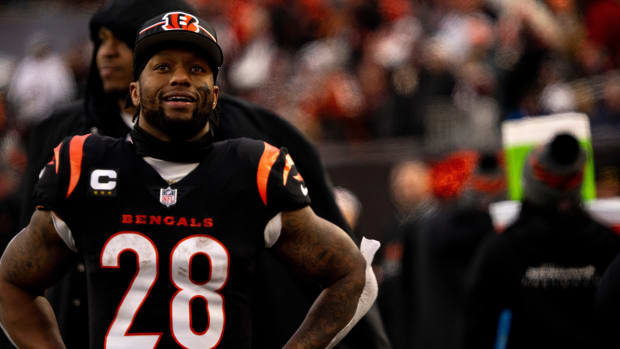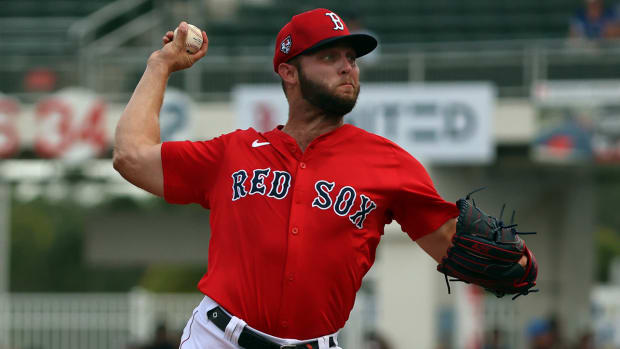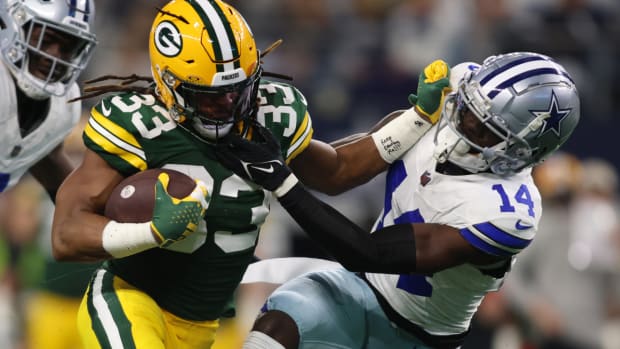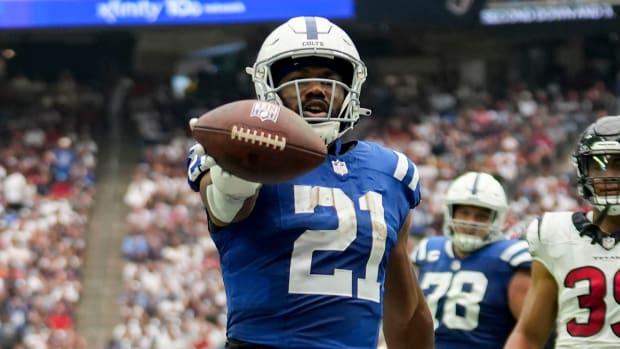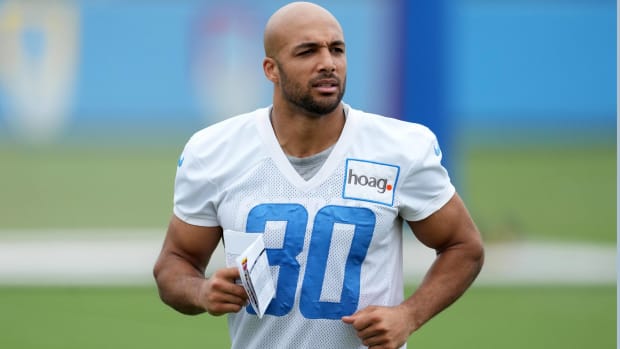Sell high on Zack Greinke?
Each week I'll answer a handful of the most pertinent questions I've received during the week in my attempt, weak as it might be, to bring insightful fantasy analysis to the fore.
I am thinking about dealing Zack Greinke, good idea or bad idea? Is his value at its peak?-- Bryan, Sherwood Park, Alberta, Canada
The gut reaction says this is a crazy idea. Why would you trade the best pitcher in baseball who is 6-0 with a 0.40 ERA, 0.84 WHIP and a 10.80 K/9 mark unless someone offered you half their team (he leads the majors in wins, ERA and Ks -- tied with Johan Santana)? However, logic would dictate that his value will never be higher and he has nowhere to go but down. Therefore, the adage of selling high may never have been so applicable. Let's do something highly unscientific to illustrate why entertaining the thought of moving Greinke isn't absurd.
All kinds of comparisons have been made to Tim Lincecum with Greinke, so let's look at Lincecum's '08 effort as a barometer for Greinke. Last year Lincecum dominated hitters going 18-5 with a 2.62 ERA, 265 K and 1.17 WHIP. If anyone told you prior to the start of the season that Greinke would post a line identical to that, you likely would have backhanded them in the face for their stupidity. Still, let's assume that Greinke were to match every single one of those totals this season and finish with exactly the same numbers that Lincecum did in 2008. Given that supposition, what would Greinke's numbers be like the rest of the way?
12-5, 3.16 ERA, 211 K, 1.25 WHIP in 182 innings.
Again this is completely unscientific, but I think it makes the point. These are still fantastic numbers especially considering that Zack has never won more than 13 games, posted an ERA below 3.47, struck out more than 183 batters or registered a WHIP below 1.28, but it still represent a major regression from his current levels. That's right, this "projected" performance for the rest of the season would still greatly outpace anything he has done until this point of his career. So you have to ask yourself -- do you see that happening from a guy who just two months ago you barely had in your top-25 starters in baseball? As great as Greinke has been a regression will occur. The only question is will it be gradual, substantial or massive? Even if we posit a gradual decline, there are still a good number of reasons to consider moving Greinke if someone bowls you over with a trade offer for a guy who has only tossed 200-innings once in his career (202.1 last year).
Carlos Pena or Ryan Howard? I know it sounds crazy, but I keep telling my friend that Pena will post better numbers this season than the Phillies' slugger.-- Chris, Arizona
Seriously? Has someone been doing a bit of huffing or perhaps drinking of some ripple out of a paper bag? This is an example of an overzealous reading of a small sample size as there is no doubt that Pena (.266-13-30-19) has far out-earned Howard (.291-6-22-16) thus far, but history tells us that it simply will not continue to be the case. Still, Pena has been hot. Dating back to the start of July last season Carlos has gone deep 33 times in just 376 ABs which would equate to 44 home runs over the course of 500-ABs. Still, Ryan Howard has hit at least 47 home runs in each of the last three seasons -- that isn't a prorated rate, that's a fact. Howard has also averaged 144 RBIs the last three seasons while scoring an average of 101 runs a season. As for Pena, he has never once scored 100-runs, and even though he has been strong the past two years he has still averaged "only" 112 RBI. Also don't overlook the fact that Howard has hit .278 since the start of the 2006 season to also outpace Pena in that category (.265). Pena has been great and he should continue to bash balls all over the yard, but let's keep our intake of helium to a minimum shall we?
I'm tired of waiting for Mark Teixeira to come around? I've been offered Joey Votto for him straight up. Should I take it?-- Kevin, Warner Robins, Ga.
Teixeira has certainly had a slow start to his career with the Yankees, but that isn't remotely surprising. First off, dude is under a lot of pressure trying to "prove" he is worth all that dough. Second, Tex has clearly been a better hitter in his career as the weather warms as April has been his worst month (.252/.352/.437). But make no mistake, the man will hit. Since his second season in the league, 2004, Mark has hit at least .281-30-105 with 86 runs each season, and he is the only man in baseball who has hit each of the plateaus in each of the past five seasons -- the only one. It might be a somewhat uneven ride but you can bank on, as much as you can with any player, that he will post the numbers you are used to reading on the back of his ball card once the season is over (plus, the impending return of Alex Rodriguez won't do anything but help).
As for Votto, he has been "money" so far hitting .370 with 23 RBIs in 27 games (who doesn't love Vince Vaughan in the movie Swingers? That is one classic flick that you should watch again if it's been a few years). The question with Votto isn't whether he will hit, he certainly will, or weather he will produce runs (again, he certainly will). The question with Votto revolves around his power. With only three home runs on the year he has been far from active in the home run category, and the reason for that is quite simple -- he simply doesn't hit the ball in the air. Barely a quarter of all his batted balls end up in the outfield (27.8%), as he smashes line drives (27.8%) and hard grounders (44.3) all over the field. Honestly, this breakdown is something that we would look for from a middle infielder and not a corner infielder, and as such Votto's ability to be more than a 20-home run option is a bit in question. The man owns a solid 16.8% HR/F ratio in his career, but until he starts lifting more balls into the air, the big power numbers likely will fall just out of his grasp. Does this lead to a scenario in which he ends up "giving back" average to try to drive the ball more? It is a situation worth monitoring moving forward.
While it is certainly tempting to pull the trigger on this deal, the smart money would be to hold on to Teixeira. The Yankees' slugger hits in a better lineup, balls are flying out of his home park at a crazy rate, and he has a track record of consistent excellence that few can match. That's worth holding on to.
I was offered Jair Jurrjens for my teams' Ryan Dempster. I need help in ERA and WHIP, so should I accept this offer?-- Ryan, Flemington, N.J.
Tempted yes, but let's investigate further before we make the call. First off, let's compare the two and their efforts so far:
Jurrjens: 3-2, 2.01 ERA, 20 K, 1.19 WHIPDempster: 2-1, 4.86 ERA, 32 K, 1.35 WHIP
There is little in those standard numbers to suggest that Dempster would be a better option in '09 than Jurrjens. What about if we take things to the next level? We'll look at Dempster first.
Dempster, coming off a spectacular season (17 wins, 2.96 ERA, 187 K, 1.21 WHIP), has struggled a bit this year, though that wasn't unexpected. Still, his numbers this season in K/9 (7.78), K/BB (2.00) and WHIP categories are all slightly better than his career numbers -- it's just that he was so good last year in comparison that he looks like somewhat of a failure in '09. Dempster has added roughly half a batter to his BB/9 mark (3.89) from '08 so that he has returned him to being below average in that matter, and as a result his WHIP has spiked a bit. However, he is still tough to hit with a .246 BAA and his BABIP is within the normal range at .293. The biggest difference in his performance thus far this season might be the fact that he is permitting a career-high 43.4% fly ball mark, and as a result his HR/9 mark is up to 0.97, well above last years 0.61 level despite the fact that his HR/F ratio has basically remained unchanged at 9% (it was 8% last year). Face it, a repeat of 2008 just isn't in the cards for him, but there are still some things to like with the Cubs' hurler.
As for Jurrjens, his ratios sparkle despite the fact that there are underlying concerns with the sinkerballer. First off, his K-rate is terrible at 4.46, two full batters below his serviceable 6.64 mark last season. Sinkerballers don't need to be high strikeout options to succeed, but the more balls put in play the greater the chance for base runners (what a genius-like statement to make huh?). Second, his BB/9 rate has inched slightly up to 3.57 leading to an atrocious 1.25 K/BB mark. History tells us that pitchers with a ratio like that find it exceedingly difficult to post an ERA anywhere near three, so that ERA is bound to skyrocket (only 21 seasons with an ERA under 3.50 and a K/BB rate of less than 1.25 have occurred since 1980). In addition, he has been exceedingly lucky so far with a BABIP mark of .236 compared to last year's mark of .311. Given his lack of swing and miss stuff, a regression is coming here which again equates to more hits and runs allowed. Finally, his LOB-rate of 86.8% is a rate that not even the incomparable Greg Maddux ever reached (his best mark was 82.9% when he posted a 1.63 ERA), so when this number normalizes, again the ratios will climb.
If you are only targeting ratios this deal might still end up making sense. However, Jurrjens is a massive step down in the K-category, and given that Dempster has thrown at least six innings in each of his six starts pitching behind what will be a potent offense once everyone is healthy, you have to wonder if moving Dempster for Jurrjens is a good decision to make given Dempster's potential upside in the "W" and strikeout categories.
With Manny out of the lineup for the next 50-games I'm thinking of selling high on Orlando Hudson. Would you trade him for a slumping Placido Polanco?-- Justin, Louisiana
If we were to look only at the numbers each has posted this season, the answer would be a resounding no.
Hudson: .339-3-17-25-4Polanco: .273-0-15-13-0
Luckily we have more data than a mere fifth of a season to look at. To that end, let's compare each batters performance since 2005 and list the average effort of each the past four years.
Hudson: .289-11-59-68-8 with 142 hitsPolanco: .319-8-58-84-5 with 170 hits
Polanco clearly comes out on top, especially when you consider that his big lead in batting average is even more substantial than it first appears given that he has a better track record of health allowing him to post that significant advantage in the category over a far greater amount of at-bats.
Obviously the loss of Manny hitting behind him can't do anything but make things more difficult for Hudson. In addition, Orlando has been so greatly outpacing his previous work that a regression would seem plausible even without the missing power bat of Ramirez. Hudson is walking at a career-high rate and striking out at a career low rate leading to a massive 1.38 BB/K mark that his literally more than double his career level (0.62). That never happens -- period. He is also operating in a fair bit of luck with a BABIP that is .042 points above his career mark of .320 which would lead to the contention that a regression in batting average is quite likely (this fact is in opposition to Polanco who is sporting a BABIP mark that is .019 points below his career mark). Factor in that Hudson has a history of being nicked up, he has appeared in 145 games only once in his career, and you have to be a tad worried about his ability to make it through a season unscathed as well. This seems like a great case of selling high (Hudson has only one .300 season his career), to buy low (Polanco owns a career batting average of .305).
































